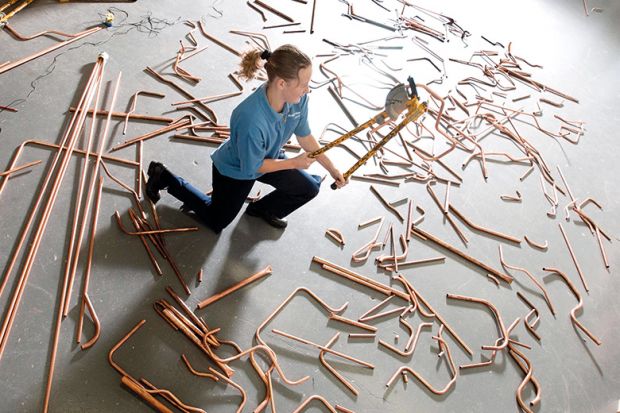The worry that too many young people go to university – and that they would be better off learning a trade instead – is a complaint heard the world over.
But nowhere does it strike as hard at the national self-image as in Germany, admired globally for an apprenticeship system credited with keeping the rate of young unemployment extraordinarily low.
In 2016, just 7 per cent of young Germans were unemployed, by some way the lowest in the European Union and far below the US (10.4 per cent), the UK (13 per cent) and France (24.6 per cent).
Companies that train apprentices have for several years been raising the alarm that, as university numbers grow, not enough young people are doing apprenticeships, cutting off the future pipeline of skilled technicians and other manual workers.
“That’s the problem for the German economy,” argued Julia Flasdick, leader of the higher education department for the Association of German Chambers of Commerce and Industry (DIHK). “You always need somebody to drive the machine as well as write the computer code.”
A DIHK survey of more than 10,000 businesses in 2016 revealed that nearly a third had failed to fill all their trainee positions. Fears about Akademisierung – where training is transferred to universities – pepper newspaper headlines; the latest concern is over nursing training shifting to universities, as has already happened in the UK.
A “great gap” could open up between what the economy needs and what university graduates are trained to do, Ms Flasdick said. On the whole, university students “get qualified mostly in theory” rather than training “on the job”, she argued.
Researchers have long wondered whether higher education in many countries has expanded well beyond economic need, perhaps because higher education has become a rite of passage – or a consumer good – for the middle class. Some observers believe that this at least in part explains rising university enrolments and weakening apprenticeship uptake in Germany.
Ms Flasdick sees the shift to it becoming “more and more normal to get an academic diploma” as a “social movement”.
As children are born to graduate parents and educated by graduate teachers, they start to view university as their only option, she said. For this reason, the DIHK has proposed that teachers should gain some experience working in companies in order to “know the real labour life”.
“The prestige value of a university degree is enormous,” said Ulrich Müller, head of policy studies at the Centre for Higher Education, a Gütersloh-based thinktank. “Vocational education is still respected, but many young people see vocational training as a first leg, not as a terminus.”
But there are other reasons why Germany’s youth might favour the campus over the workshop. Part of the explanation is about regional mismatches, with too few youngsters in small cities and the countryside where places are available, explained Heike Solga, an expert on skills and labour markets at the Free University of Berlin.
Second, apprentices in less prestigious positions are paid very poorly, she said. A trainee hairdresser might receive just €350-€400 (£311-£356) a month, not enough to allow them to move out of their parents’ house, Professor Solga explained, and sectors with shortages such as hotel work or food processing often involve shift and evening work. “For young people, they are not the best working conditions,” she said.
Graduates also enjoy bigger average lifetime earnings, said Clemens Wieland, an expert on lifelong learning at the Bertelsmann Stiftung, which produces policy advice. “But you have to keep in mind that this is only a statistical average” and that there is great variation between professions, he added, a point that the DIHK is keen to get across to the parents and teachers who believe that a degree always leads to better pay.
Another shift is that companies require more flexible workers, a demand that has benefited universities. Vocational education gives trainees “practical skills that are relevant in a specific context”, said Mr Müller. “But a university is an organisation in which human beings acquire and apply the competence to work on new problems in a verifiable and methodically sound way. This is what industry requires,” he argued.
The lines between the two types of education are also increasingly dissolving, with universities now offering more “dual” degrees that involve substantial on-the-job training, and with apprenticeships covering more theory.
And it may be that the tide is turning against Akademisierung. The Organisation for Economic Cooperation and Development, one of the bodies that has pushed countries to raise their graduate quotient, has in recent years “changed its opinion” because of the success of dual systems in Germany, Austria and Switzerland at keeping youth unemployment low, pointed out Mr Wieland.
Register to continue
Why register?
- Registration is free and only takes a moment
- Once registered, you can read 3 articles a month
- Sign up for our newsletter
Subscribe
Or subscribe for unlimited access to:
- Unlimited access to news, views, insights & reviews
- Digital editions
- Digital access to THE’s university and college rankings analysis
Already registered or a current subscriber?








